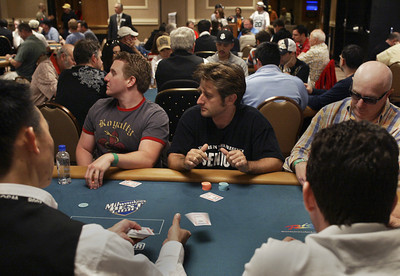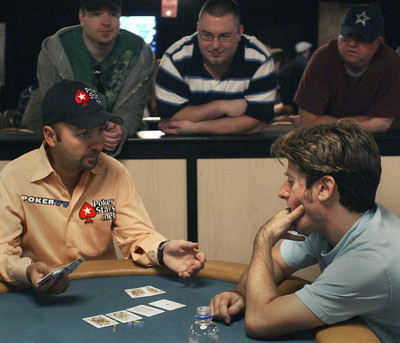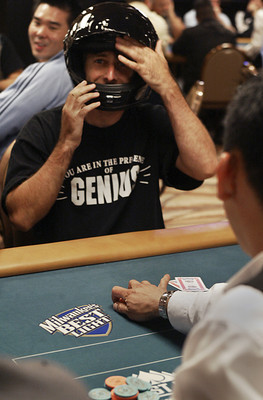FOOL HOUSE (Poker Player)
I have an ace and a king, one of the best starting hands possible.
I'm playing against nine highly skilled players in the World Series of Poker. All have traveled to this table from across the country or world -- at least that's my guess, according to one man's indecipherable accent.
Ours is what's known as a satellite game. In exchange for $175 cash, we are each competing for a single $1,500 seat in the main event.
I raise $200. That's the advice of the guy who coached me. I feel the sting of better players' eyes on my sweaty brow.
The game is no limit Texas hold'em -- "the Cadillac of poker," according to Matt Damon's voiceover in "Rounders." Each player is dealt two cards face down and tries to make the best five-card hand by combining them with five community cards flopped face up by the dealer.
One by one, my opponents fold their cards, leaving me with $75. I should have won hundreds, if not thousands. This is not right.
But I have what's known as "tells." Other players can tell that I liked my cards by reading subtle cues in my face.
The World Series of Poker runs at the Rio until July 14, with two main events per day. Last year, 55,000 would-be champions entered. "Rounders" ended with Matt Damon en route.
"First prize is a million bucks," his voiceover said. "Does it have my name on it? I don't know. But, I'm gonna find out."
Before I view my next hand, I pull out my secret weapon: a motorcycle helmet, its visor tinted limo black. Some poker players wear sunglasses to hide their tells. Some need bigger sunglasses than others.
I introduce myself as Phil Helmet. My opponents smile. They recognize the reference to World Series of Poker champ Phil Hellmuth.
They like me. Not only are they going to take all my chips, they're going to laugh while doing it.
I make my bet, a $700 raise, then slam my tinted visor down.
"Only in Vegas," says a passer-by who checks me out while shaking his head.
The guy who coached me approaches the table.
"Let's have a look at what you got," says Daniel Negreanu, the third-leading winner in the history of poker. (Two days before, the Las Vegas resident won his fourth World Series of Poker gold bracelet and $200,000. "It was a good day," Negreanu told me.)
Nine jaws collectively unhinge from their skulls.
"Who are you?" the gray-haired gentleman three seats to my right asks me.
This is the equivalent of Kobe Bryant stepping onto the court during a high school pickup game. (I must admit, however, that it's not happenstance. I begged Negreanu's assistant for days to make it happen.)
"Let's see what happens," Negreanu says after I show him my pair of sixes.
Most students come to Negreanu with poker knowledge vaster than mine: the lyrics to Kenny Rogers' "The Gambler." I actually need to concentrate to remember whether a flush beats a straight. (It does.)
"I can't make miracles," Negreanu said during my training, "but what I can do is hopefully make you competitive."
With any decent starting hand, Negreanu advised, raise four times the biggest bet before a single community card hits the table. Denying opponents their right to see the flop and strategize, this is the poker equivalent of shooting a gunslinger before the duel, while he's still pacing away from you.
"We can make you at least look like you have a chance," Negreanu said. "I have faith in you."
Negreanu, 34, grew up in Toronto, gravitating to pool halls in his teens.
"Through that, I met some seedy guys who introduced me to poker," he said. "I started playing three or four times a week, and I started noticing that the same guys won all the time.
"There was skill involved."
The player to my right has something to tell me.
"I saw your cards when you showed them to Daniel," he says, laughing, as he raises his bet to double mine.
"It's your fault," Negreanu tells me, shrugging his shoulders. "You goofed up."
Already pot-committed, I call "all in," heaving every one of my chips to the center of the table. Phil Helmet will not be intimidated.
Negreanu said his favorite thing about poker as a career is "that I can be my own boss and no one can tell me what to do."
On the other hand, he said, "not knowing how much you're gonna make each week or not having a paycheck can be stressful for a lot of people." (Negreanu is not one of those people, however, having earned more than $10 million since 1997.)
Both my tormenter and another player show their cards. One has a king, another a jack. But there are no other kings or jacks in sight. As dealer Jimmy Huynh draws the fifth and final community card, my two sixes remain the highest pair.
With this single play, I body-slam two opponents to the poker felt. (One takes his photo with Negreanu on his way out of the room.)
I imagine Phil Helmet going all the way this year, my face adorning every poker magazine (well, my covered face anyway).
"I'm sorry, sir," says the security officer tapping me on the shoulder. "You have to remove the helmet.
"We have to see faces in here."
OK, so maybe not.
Still, my winning streak continues. And if I were a better player, I could explain exactly how.
It probably has to do with how many computations are required of experienced poker players. They must constantly consider whether opponents could have a higher card or pair, a flush, a straight, a full house, or triple or quadruple matching numbers. After they figure all that out, they need to guess whether opponents are representing the truth or not.
When you play like me, you don't worry about any of that stuff. (Later, I'm told, no poker player with any sense would have held onto pocket sixes unless he was positive the others were bluffing.)
One by one, my foes lose their smiles along with their chips. Of the few I don't eliminate personally, they eliminate each other in battles that give me a sense of how it must have felt for America to watch the Nazis fight the Russians in World War II.
Even my college buddy, Johnny Salter, visiting me from Cincinnati, has been knocked out. And he's one of the best players I've ever seen.
"Your opponents are trying to read what you have," World Series of Poker media liaison Seth Palansky explains as he watches the action, "and you don't even know."
Palanksy, who also watched Negreanu trying to teach me, set my odds of winning as "one in 10" because of the number of players at this table, "but really one in a thousand." He told his co-workers he would be finished overseeing my game in 10 minutes. It has now been two hours.
I didn't need Phil Helmet after all. Cluelessness is a much more effective secret weapon.
The final showdown occurs between me and the guy with the indecipherable accent.
"Are you sure we can't make a deal?" he asks, like a "Sopranos" victim pleading for his life (or at least I think that's what he asks).
The gentleman wants a piece of my winnings in exchange for forfeiting the game. My chip stack resembles a model of the Excalibur castle, his a single piece of sushi.
"I'm sorry," I tell him, like Paulie Walnuts before pulling the trigger.
Three hands later, the very first poker game I have ever won makes me $1,500 richer. (I'm stupid, but not stupid enough to play in the main event. I sell my winning seat to a man waiting on line to purchase one.)
"I can't believe what I just witnessed," Palansky says.
I interrupt Negreanu, who is playing a game in a far more important room down the hall.
"High five!" he screams, explaining what happened to his opponents, who include (so I had to be told) poker greats Erick Lindgren, Robert Williamson III, Eric Seidel and the actual Phil Helmuth.
"That's insane!" Negreanu gushes. "That's incredible!"
He adds, "I had no faith in you whatsoever!"
Watch video of Levitan's logic-defying poker win at www.reviewjournal.com/columnists/levitan.html. Fear and Loafing runs Mondays in the Living section. Levitan's previous columns are posted at fearandloafing.com. If you have a Fear and Loafing idea, e-mail clevitan@reviewjournal.com or call (702) 383-0456.
Watch the video



















